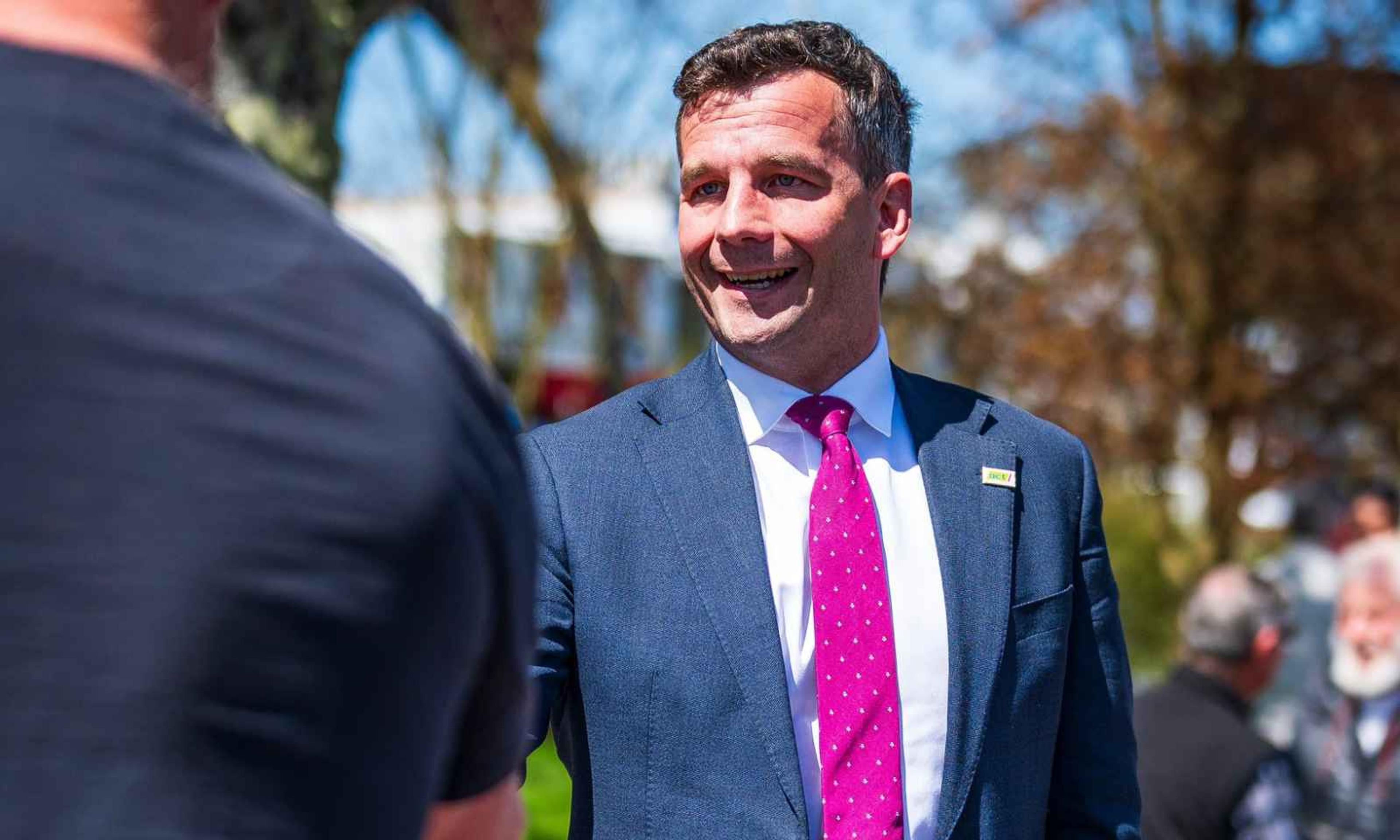

Since 1978, and every 1 October, Tuvaluans across the world celebrate their independence from the United Kingdom..
Photo/Polynesian Pride
New visa offers lifeline for Tuvaluans amid global climate crisis
As Tuvalu faces the threat of 'drowning' by 2050, a wave of applicants is seeking a fresh start in Australia. But what about the 'brain drain'?

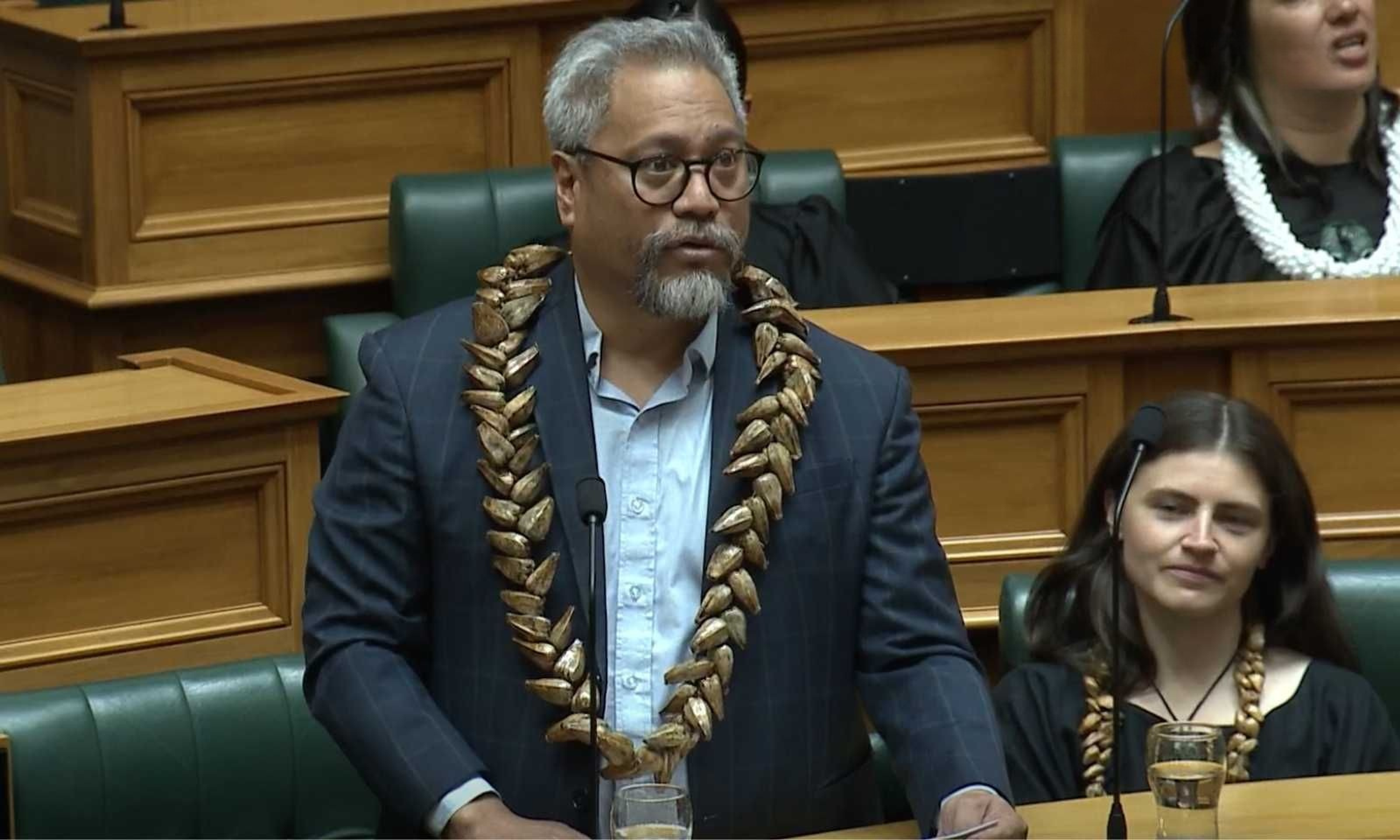
Green MP says the proposed immigration changes risks reigniting Dawn Raids trauma

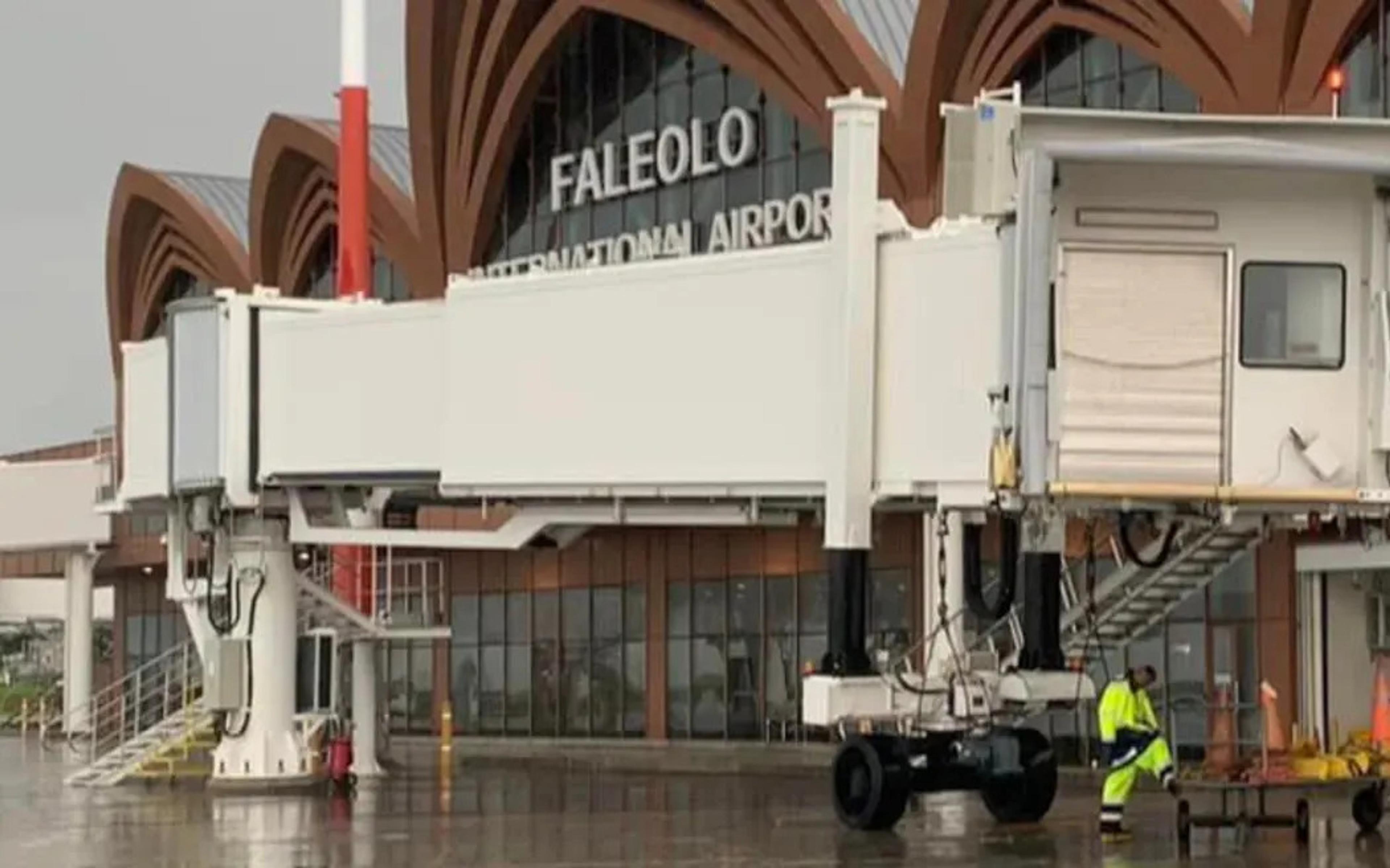
'I don't want to travel anymore': Sāmoa government urged to reconsider fee hike

Pacific child poverty rises as Deputy PM points to economic growth as solution

Green MP says the proposed immigration changes risks reigniting Dawn Raids trauma


'I don't want to travel anymore': Sāmoa government urged to reconsider fee hike
Pacific Islanders, especially those from the climate-threatened nation of Tuvalu, are taking advantage of Australia’s new resettlement aimed at helping people affected by climate change.
The move is part of a special agreement called the Falepili Treaty, which was signed by both nations in 2023. By 2050, scientists predict that much of Tuvalu's main atoll, Funafuti, which is home to 60 per cent of the nation's residents, will be underwater.
It's estimated that each year, up to 50,000 people from the Pacific region could lose their homes due to the climate crisis. Since 2015, about 10 per cent of residents from Tuvalu and other nearby islands like Kiribati and Nauru have already migrated due to rising sea levels.
Tuvalu is located 3800km north of New Zealand. According to the Australian government, around 40 per cent of Tuvalu's population - about 10,000 people - have applied to move permanently to Australia. They can do this through a special visa programme known as the Pacific Engagement Visa (PEV), which was recently launched as part of the Falepili Treaty.
Australia is not the only country trying to help those affected by climate change. New Zealand has had a similar programme since 2002, called the Pacific Access Category visa ballot, which allows up to 650 citizens from Kiribati, Tuvalu, Tonga, or Fiji to settle in Aotearoa each year.
The PEV lottery enables up to 3000 people from Pacific island countries to register for a chance to become permanent residents in Australia annually. A specific visa for Tuvaluans was introduced in June to streamline their applications, eliminating the need for a job offer, and with an annual limit of 280 visas.
The PEV programme provides a way for Pacific Islanders to apply for residency in Australia. A special Tuvalu-specific visa was introduced in June 2023, allowing Tuvaluans to apply directly without requiring a job offer, with an annual cap of 280 visas.
Within just a few days of launching this visa ballot, over 1100 Tuvaluans signed up, increasing the total to 4052 when including family members.
While many Tuvaluans are eager to move for better opportunities, the decision to leave home isn't easy, as they need better education and job prospects for their families.
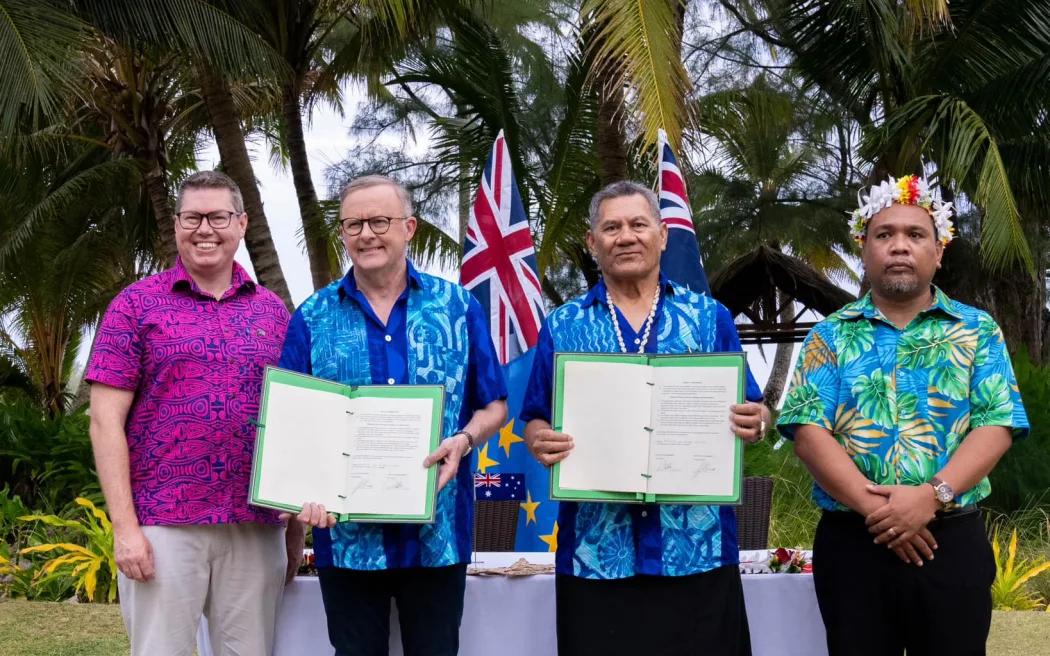
Australia's Prime Minister Anthony Albanese, second from left, and his Tuvalu counterpart, Kausea Natano, third from left, signed a treaty known as the ‘Falepili Union’ in 2023. Photo/Anthony Albanese
'Alopi Latukefu, Director of the Global Centre for Social Justice and Advocacy Leadership, says Tuvaluan communities across its nine atolls are dealing with serious challenges, including rising seas, food shortages, and limited access to clean water.
He told Reuters that deciding to leave is a major and complicated choice tied to many important issues. "....To support their families, to provide a pathway for a future, to have access to education, to have access to things that are part of the opportunity that Australia represents."
Australia sees the PEV programme as a way to strengthen relationships with Pacific Island nations and improve security in the region, analysts say, as global dynamics change.
Some experts suggest that the PEV is a generous opportunity because it allows approved applicants to access healthcare and education immediately, unlike typical migrants, who might have to wait several years for such benefits.
Professor Stephen Howes, Director of the Development Policy Centre at the Australian National University, says that individuals who receive this visa will have extensive rights and support in Australia.
This includes not only access to healthcare but also financial assistance and educational support. He says successful applicants will have access to Medicare and other forms of assistance, including family benefits and support for further study.
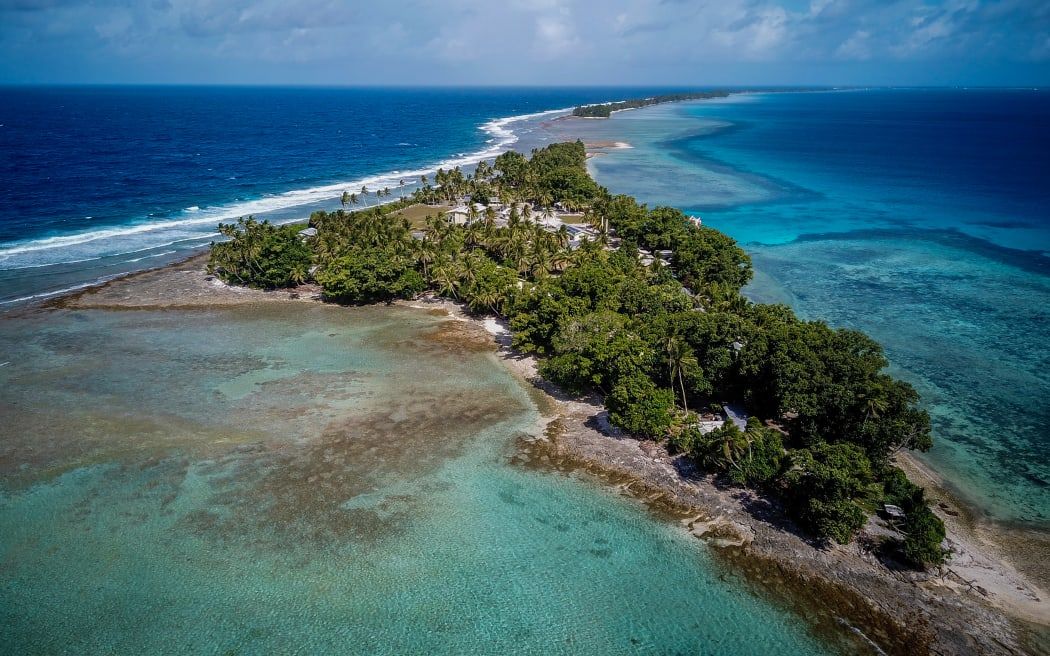
Tuvalu has an average land elevation of less than two metres above sea level. Photo/UNDP/Aurélia Rusek
But there are concerns that while Australia is attracting migrants, it could lead to a “brain drain” in the Pacific. This means that skilled individuals may leave for better opportunities abroad, which could have a negative impact on their home countries.
As of 2021, the number of people with Pacific Islander heritage living in Australia has grown significantly, from about 217,000 a decade earlier to more than 330,000 today, according to a report from the ANU, which analysed Census data.
The report also reveals that the change has raised concerns about the challenges facing the islands, as many residents consider moving away.
A recent report from the World Bank and the Australian National University highlights that people from Pacific islands can earn more money in Australia compared to their home countries.
For example, Tongans can make up to four times their usual income, while workers from Vanuatu can earn nearly 10 times more.
On average, around 60 per cent of what they earn in Australia is sent back home to their families, the report states, through the Pacific Australia Labour Mobility (PALM) scheme, which allows seasonal workers to take on jobs in Australia.
Many migrants feel they have no other option but to leave their homes in search of better opportunities. This is particularly concerning in Fiji, where Deputy Prime Minister Manoa Kamikamica is worried about the growing number of skilled professionals, such as those in the tech industry, leaving the country.
“This is a matter of great concern to our nation, as the loss of highly skilled professionals in the IT sector can have serious implications for our economic growth and competitiveness,” he told a conference.
Sāmoa has also raised similar concerns about the exodus of its citizens to New Zealand and Australia. The government in Apia believes people are leaving in search of better opportunities, family connections, and educational possibilities.
While some aspects of this type of migration can be beneficial, it also brings difficulties, such as possible worker shortages and the loss of skilled professionals.
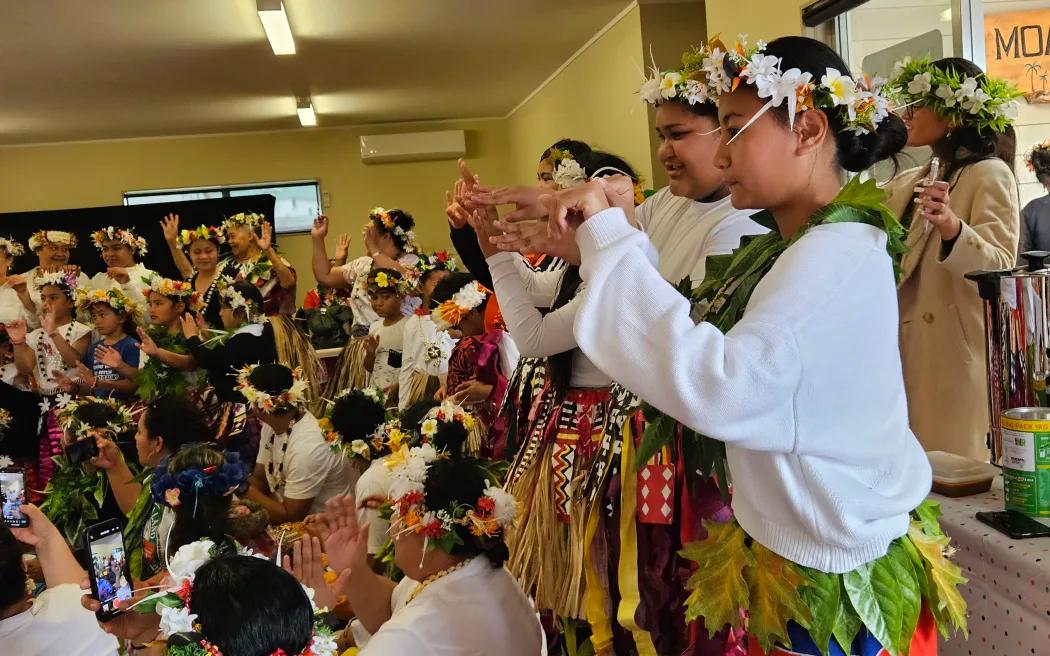
Young Tuvaluans celebrate their language and culture in Aotearoa. Photo/RNZ Pacific/Tiana Haxton
More on the PEV?
The Australian government has received more than 56,000 applications from citizens across the Pacific and Timor-Leste for a programme designed to help people migrate without causing a "brain drain".
To be eligible for this programme, applicants must be under 45 years old, be from a specific country, hold a valid passport, and have a confirmed job offer.
Those who receive a PEV can live, work, and study in Australia indefinitely and have access to healthcare and education just like Australian citizens. They can also apply for citizenship and bring their family members to live with them.
Some experts believe that the PEV could be a valuable option for Pacific islanders looking to migrate due to climate change.